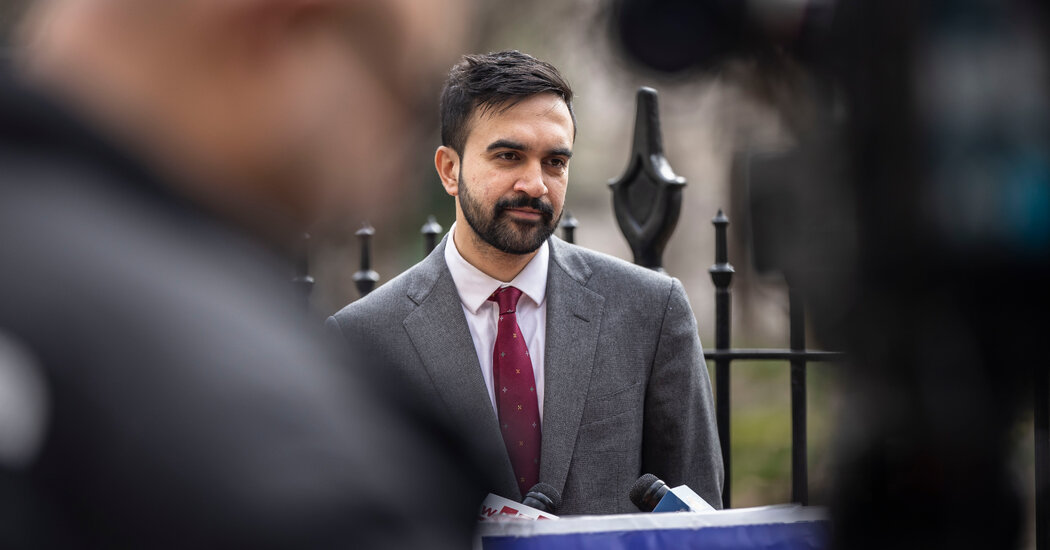During his whirlwind rise in the New York City mayoral race, Assemblyman Zohran K. Mamdani has put forth a wish list of big, expensive ideas.
Rents for stabilized apartments will be frozen. Buses will be free. Taxes on the wealthy will rise and the cost of child care will fall — to zero.
These proposals have energized his base, but their ambition will almost certainly exceed the ability of any mayor to see them through. The gap between what Mr. Mamdani wants to achieve and what is politically doable also characterizes his tenure as a state lawmaker.
Of the 20-odd bills Mr. Mamdani has introduced during more than four years in Albany, just three relatively minor items have become law. He boasts of his signature free-bus initiative, but the pilot program was not renewed. And a much-ballyhooed proposal to clamp down on nonprofits supporting Israeli settlements was effectively dismissed by Assembly leadership in a rather public fashion.
But more than two dozen lawmakers and staff members, including leaders in the Democrat-controlled Senate and Assembly, said in interviews that measuring Mr. Mamdani’s impact in Albany requires looking beyond the number of bills that he introduced or that became law.
They said Mr. Mamdani, 33, has made a conscious decision to use his voice to move the ideological center of the Assembly to the left.
“He is an exceptional communicator,” said Senator Julia Salazar, a friend and fellow Democratic Socialists of America member, who has endorsed him as part of a ranked-choice slate. “I think his time in the Assembly has been characterized more by that than changing the law.”
Apart from a bill that would require utilities to tell customers of proposed rate hikes, few of Mr. Mamdani’s initiatives have shown signs of movement. Small-bore proposals, like a pitch to make clear to voters that they need to be registered with a party to vote in a primary, have failed to gain traction.
The relative scantness of his record caused some colleagues to question his commitment to the unglamorous work of crafting legislation.
“I wish he was a harder worker,” said Senator Jessica Ramos, a Democrat who is also running for mayor. “I believe that anybody who should be the mayor of the City of New York should have a legislative record to match.”
But colleagues also acknowledged that he had engaged deeply with the legislation of others, helping to push parts of the Good Cause Eviction platform, the Build Public Renewables Act and an expansion of child care across the finish line, in large part by harnessing and focusing public attention.
“He’s been seen as someone who can mobilize public opinion out of a certain demographic,” said the Senate deputy majority leader, Michael Gianaris, who has worked with Mr. Mamdani on a handful of local issues in their Queens districts. “The mayor’s race has not only proven that to be true, but probably increased his capacity to do that as well.”
Mr. Mamdani’s roots in progressivism and deft use of social media have prompted comparisons with Representative Alexandria Ocasio-Cortez, a fellow New Yorker whose endorsement could prove pivotal for Mr. Mamdani as the June 24 primary election nears. She also faced criticism early in her career over a seeming preference to criticize, rather than work within, the Democratic systems of power.
Mr. Mamdani disputed the notion that he is more interested in messaging than in legislating.
“My belief in politics is a belief in making the principled possible,” he said. “And that requires working with anyone and everyone who shows interest.”
When asked about his proudest moments in Albany, he pointed to a raft of improvements to the Metropolitan Transportation Authority that were included in the 2023 budget, including his free bus pilot.
“That was an achievement that I was only able to win due to building a coalition across ideology,” said Mr. Mamdani, noting the pivotal support of Mayor Eric Adams, even as he described the mayor as being directly “in opposition to politics that I and many New Yorkers hold.”
The free bus program made five lines — one in each borough — free for one year. The pilot was celebrated for boosting ridership, but the M.T.A. cautioned that it also caused confusion and may have led to increased fare evasion on other lines.
Mr. Mamdani and his allies returned to the Capitol with a plan to expand the program in 2024 to a handful of buses in each borough. Five people familiar with the negotiations said that he was close to securing the expansion when an unrelated disagreement over housing reform undermined his efforts.
The people familiar with the talks said that Mr. Mamdani opposed a landlord-friendly measure added late to the state budget, and that he told the Assembly speaker, Carl E. Heastie, that he would vote against the budget because of the measure.
Mr. Heastie was incensed, the people said, and killed the bus pilot. Both Mr. Mamdani and Mr. Heastie deny that any retaliation occurred and say the program fell apart for reasons of its own. The episode was previously reported by Politico and New York magazine.
It was not the first time Mr. Mamdani refused to support the budget. The year before, he also voted no to protest changes to the state’s bail law. And in 2021, he voted yes, but only after asserting that he had been coerced into doing so.
In an Assembly floor speech that year, he said he wished for a government “that does not force us to take back too little to our constituents.”
“And if that change requires us to change the composition of this body, then so be it,” he added, in a threat to incumbents that echoed a similar move by Ms. Ocasio-Cortez.
The protest vote can be a useful tool, most lawmakers agree, but its overuse is considered unsportsmanlike.
“It’s hard to say, ‘I want stuff in the budget,’ and then not vote for the budget. I mean, you can’t have it both ways,” said Assemblyman Jeffrey Dinowitz, who chairs the powerful Codes Committee.
“You’re telling people: rent freeze, free child care, free buses, free this, free that,” Mr. Dinowitz said, “but, you know, nothing is really free. Somebody else is paying for it.”
Mr. Heastie, the Assembly speaker, said in an interview that he had a good relationship with Mr. Mamdani, whom he described as honest and passionate. “I get no surprises out of Zohran, and I respect that out of him,” he said.
Another of Mr. Mamdani’s stalled legislative proposals grew out of his support for Palestinians and criticism of Israel. He introduced a bill that would end tax-exempt status for New York charities with ties to Israeli settlements that violate international human rights law.
Shortly after it was introduced in spring 2023, Assembly leadership took the unusual step of weighing in on the legislation, calling it a “non-starter.”
Mr. Mamdani persisted in pushing for the measure. That effort, combined with his lack of an immediate expression of sympathy for Israel after the Hamas attacks of Oct. 7, 2023, deeply angered some members. More recently, Mr. Mamdani again was placed on the defensive after he did not co-sponsor a resolution to acknowledge the Holocaust.
Assemblywoman Amanda Septimo, a Democrat and friend of Mr. Mamdani’s, said that she did not believe him to be antisemitic. But she nonetheless opposed his bill and said some of his rhetoric “unintentionally opens the door for people who may be antisemitic to hide under the guise, we’ll call it, of other concerns.”
Mr. Mamdani stands firm in his defense of Palestinians in Gaza, where over 53,000 people have been killed by Israeli forces, saying, “At the core of this campaign is a politics of consistency and the belief that all people deserve dignity and equality and freedom without exception.”
In recent interviews, he has proclaimed Israel’s right to exist, and last week he was quick to denounce the killing of two Israeli Embassy employees in Washington as part of “an appalling trend of antisemitic violence.”
His fellow legislators say that Mr. Mamdani is still on a learning curve in Albany but is progressing. They say he seems more attuned than before to what it takes to accomplish policy changes, and more judicious when criticizing colleagues.
Mr. Heastie also said that he believed Mr. Mamdani had “legislatively matured,” even joking that he liked “Zohran 2.0.”
Perhaps the most telling evidence of Mr. Mamdani’s evolution came earlier this month, when the budget bills came up for a vote. As in years past, they contained scores of policy changes, not all to Mr. Mamdani’s liking.
Mr. Mamdani voted yes.
Grace Ashford covers New York government and politics for The Times.
Benjamin Oreskes is a reporter covering New York State politics and government for The Times.
The post Mamdani Has a Thin Legislative Record but Is a Forceful Voice in Albany appeared first on New York Times.




